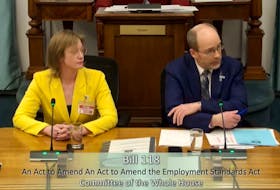The UPEI student union says it will be pushing the incoming government on the importance of additional financial aids for post-secondary students.
Still, Emma Drake, the incoming president of the student union, applauds the fact that the current Liberal government boosted the George Coles Bursary from a moving scale to a guaranteed $2,200 per year.
The bursary used to be worth $2,200 for first-year students, $500 for second-year, $800 for third-years and $1,500 for seniors.
“I think it’s important to take that affordability lense to what (government) needs to do to support students,’’ Drake said. “Specifically, with the needs-based grants we, as a student union, believe it is more effective than George Coles because you are supporting students who either wouldn’t be able to access post-secondary education or would incur insurmountable amounts of debt.’’
The student union has advocated for what Drake calls needs-based grants since 2013. Needs-based grants would effectively support low- to middle-income students with financial aid.
Drake said not all students who receive George Coles Bursary money use it for the purpose intended.
“There were some students who absolutely needed it and relied on it, but there were other students who would use that money for a spring break trip."
Drake said government did introduce one needs-based program in the spring called Island Advantage in addition to making the George Coles Bursary a consistent $2,200 per year.
Promises made
The following education promises have been made by the four political parties:
- Progressive Conservative party promises to fund an open textbook project for Island post-secondary institutions to help ease the cost of accessing educational resources
- Progressive Conservative party promises to increase the George Coles Bursary to $3,000
- NDP promises to ensure free post-secondary tuition for Island students for their first degree or diploma
- Liberals proposes a new $500 Island education bond for every eligible child under the age of 16 in the province, beginning in 2020. In turn, this will allow Island families to leverage the Canada Learning Bond, a federal program that provides an additional $2,000 to eligible children who participate
- The Green party’s platform includes classroom supplies for teachers, ECE wage parity, improve DACs, supporting the development of open educational resources, expanding afterschool programs and a universal school food program
Swata Daboo, the incoming vice-president of academic and external at UPEI, said they’ve also in the past fought for a provincial cap on student debt and advocated for parental income to be exempt from loan assessments.
Daboo said a student debt relief program was introduced last year but it’s too early to say how effective it’s been.
The amount of debt students carry on P.E.I. is high. Drake didn’t attach a figure to it, but it is higher than the national average.
“Debt relief is something we want to continue to look into,’’ Drake said. “We’re encouraging governments, particularly an incoming government . . . to continue supporting a needs-based program.’’
The cost of textbooks is another major issue. A first-year science student can expect to pay close to $1,000 per semester.
“We have advocated that all first-year courses should be taught by means of open educational resources,’’ Daboo said. “Seeing that reflected so far has been promising.’’
Both the Liberal and Progressive Conservative platforms mention open educational resources. It essentially means provincial funding goes to the institution so that academics can adapt or write textbooks for a specific course. Psychology 101 at UPEI has an open educational resource, offering students the information they need for free online. It saved students about $150,000.
“Hopefully, over the next four years we’ll see dedicated funding towards an open textbook project at UPEI,’’ Drake said.
“I think government just needs to provide more support, whatever it might be, in terms of student debt, in terms of lowering the cost of attending a post-secondary institution.’’
RELATED









